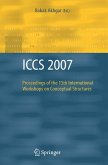Dieser Download kann aus rechtlichen Gründen nur mit Rechnungsadresse in A, B, BG, CY, CZ, D, DK, EW, E, FIN, F, GR, HR, H, IRL, I, LT, L, LR, M, NL, PL, P, R, S, SLO, SK ausgeliefert werden.
"General impression is that the Handbook on Ontologies in Information Systems provides a comprehensive overview of the current status and future prospectives of the field of ontologies. The handbook demonstrates standards that have been created recently, it surveys methods that have been developed and it shows how to bring both into practice of ontology infrastructure and applications that are the best of their kind. ... With its coverage of research and applications it provides valuable insights, both for researchers and practitioners." (Jaroslav Veselý, Neural Network World, Issue 1, 2005)
"The handbook is formed as a collection of papers written by many authors. These papers are collected into chapters devoted to separate problems of ontologies. ... This book presents an interesting collection of information about all aspects of ontology processing and applications and also references to other information sources from this field." (Tomas Brandejsky, Neural Network World, Vol. 14 (6), 2004)
From the reviews of the second edition:
"The focus is on theory, construction techniques used by researchers, and research prototypes. ... The content of the book is largely condensed from the research literature ... . The researcher or student who wants details about formalisms and techniques ... this book provides a good starting point for further investigations and a reasonably up-to-date summary of current knowledge ... . The book should be useful to researchers in this and related areas, as well as practitioners of knowledge management and information modeling in various domains." (R. M. Malyankar, ACM Computing Reviews, March, 2010)
From the reviews:
"General impression is that the Handbook on Ontologies in Information Systems provides a comprehensive overview of the current status and future prospectives of the field of ontologies. The handbook demonstrates standards that have been created recently, it surveys methods that have been developed and it shows how to bring both into practice of ontology infrastructure and applications that are the best of theirkind. ... With its coverage of research and applications it provides valuable insights, both for researchers and practitioners." (Jaroslav Veselý, Neural Network World, Issue 1, 2005)
"The handbook is formed as a collection of papers written by many authors. These papers are collected into chapters devoted to separate problems of ontologies. ... This book presents an interesting collection of information about all aspects of ontology processing and applications and also references to other information sources from this field." (Tomas Brandejsky, Neural Network World, Vol. 14 (6), 2004)
From the reviews of the second edition: "The focus is on theory, construction techniques used by researchers, and research prototypes. ... The content of the book is largely condensed from the research literature ... . The researcher or student who wants details about formalisms and techniques ... this book provides a good starting point for further investigations and a reasonably up-to-date summary of current knowledge ... . The book should be useful to researchers in this and related areas, as well as practitioners of knowledge management and information modeling in various domains." (R. M. Malyankar, ACM Computing Reviews, March, 2010)









